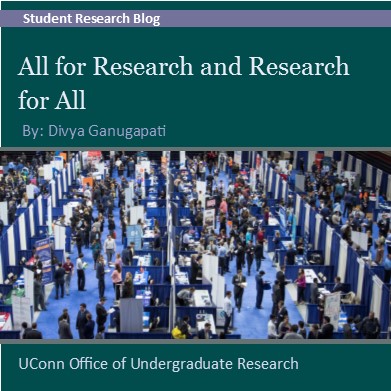 By: Divya Ganugapati, OUR Peer Research Ambassador
By: Divya Ganugapati, OUR Peer Research Ambassador
A common myth about undergraduate research is that it is only intended for students interested in pursuing post-graduate programs. While research background may be beneficial for undergraduates looking towards graduate schools, it can also serve as a very influential experience for students seeking employment post-graduation.
In fact, research is a vital part of each profession and is constantly being performed by professionals in all lines of work. Don’t believe me? Here are just a few of many examples of the importance of research in various fields that might not require a graduate degree:
- Education – Constant evaluation and analysis of student comprehension and performance on standardized exams paired with understanding trends in modern teaching tools, as a method to adjust curriculum and assessment protocol
- Marketing – Inspection of consumer trends, social media usage, societal movements, and advertisement platforms as a means of developing direct and profitable outreach for companies
- Economics – Microeconomic analysis of financial actions in order to develop model scenarios as bases for various analyses, such as risk, cost-benefit and response function
- Political Science – Interpreting voter turn out and political representation in states and counties across the country to create fully inclusive campaign tours and techniques to elevate votes and awareness for candidates
- Art – Examination of painting and stylistic techniques, including brush strokes, type of paint, color scheme, and more, to classify and identify pieces into appropriate art periods to affirm proper display etiquette
This list can continue with the addition of countless more occupational fields consisting of even more specific and specialized research topics depending on the exact profession within the field.
Now that you know how research can be implemented in your future careers, why not start to engage in research during undergraduate studies! Participating in undergraduate research can help manifest skills that are beneficial for the rest of your undergraduate career, as well as ones that will stay with you forever. Through my own research experiences, I have accumulated both short-term and long-term benefits that have been important in boosting my confidence towards reaching my goals.
Short-term Benefits
- Networking with peers – Through research, I have met other students with interests similar to mine. Due to our overlap in interests, we ended up sharing some courses and creating study groups to foster growth
- Clarity – Being able to get hands-on experience in my field of interest allowed me to solidify my career path beyond what my classes have taught me
- Motivation – In my research lab, I have learned information early on in my college experience that has served as an important foundation for doing well in my higher level classes later on
Long-term Benefits
- Networking with professionals – On campus, I have been able to meet professionals and faculty through poster exhibitions such as Frontiers in Undergraduate Research and Language Fest. Some students are even able to present their research nationally and globally allowing them to meet renowned scientists around the world
- Presentation skills – Fear of public speaking no longer exists now that I have been able to practice explaining my research in front of peers and faculty at events across campus
- Professional writing skills – By reading literature and writing proposals, research exposed me to the realm of being a professional writer, a skill that is vital for any important correspondence
- Problem-solving skills – Anyone can tell you that research is rarely a straight forward endeavor, but learning how to approach a setback in a calm and competent manner will be a great advantage when employed
Divya Ganugapati is a junior majoring in Cognitive Science and minoring in Chemistry. Click here to learn more about Divya.